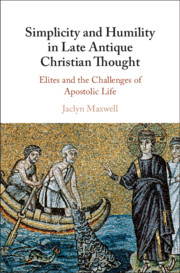 Simplicity and Humility in Late Antique Christian Thought
Simplicity and Humility in Late Antique Christian Thought Book contents
- Simplicity and Humility in Late Antique Christian Thought
- Simplicity and Humility in Late Antique Christian Thought
- Copyright page
- Dedication
- Contents
- Acknowledgments
- Abbreviations
- Introduction
- Chapter 1 Roman and Early Christian Attitudes toward Social and Economic Divisions
- Chapter 2 Christian Attitudes toward Social and Economic Divisions in Late Antiquity
- Chapter 3 Tentmakers and Fishermen
- Chapter 4 Apostolic Simplicity and Elite Education in Late Antique Theological Controversies
- Chapter 5 The Virtue of Humility in Late Antiquity
- Conclusions
- Bibliography
- Index
Chapter 2 - Christian Attitudes toward Social and Economic Divisions in Late Antiquity
Published online by Cambridge University Press: 26 March 2021
- Simplicity and Humility in Late Antique Christian Thought
- Simplicity and Humility in Late Antique Christian Thought
- Copyright page
- Dedication
- Contents
- Acknowledgments
- Abbreviations
- Introduction
- Chapter 1 Roman and Early Christian Attitudes toward Social and Economic Divisions
- Chapter 2 Christian Attitudes toward Social and Economic Divisions in Late Antiquity
- Chapter 3 Tentmakers and Fishermen
- Chapter 4 Apostolic Simplicity and Elite Education in Late Antique Theological Controversies
- Chapter 5 The Virtue of Humility in Late Antiquity
- Conclusions
- Bibliography
- Index
Summary
Christian scriptures raised questions about the prevailing social order by proclaiming that the meek would inherit the earth, the exalted would be humbled, and the wise of this world would be cast down. Jesus message was initially spread by manual labors who lacked the credentials that typically proved one’s spiritual or cultural authority. But, by the mid-fourth century, Christianity did not seem to pose a threat to the status quo. Well-off Christians continued to maintain their high status and to express their advantages through their behavior and appearance. Likewise, Christian communities did not rally for social reversals on earth, nor did they expect their leaders to be manual laborers like the apostles. The domestication of socially disruptive Christian teachings that had begun with the second- and third-century apologists continued in the late fourth and early fifth centuries, when a generation of influential church leaders produced what would become the standard answers about many questions on doctrine and biblical interpretation. In order to understand the factors at play when these theologians and preachers dealt with the social critique embedded within their religious tradition, it is necessary to take into account their social and economic backgrounds, as well as the prevailing upper-class attitudes toward wealth, poverty, social status, and manual labor.
- Type
- Chapter
- Information
- Simplicity and Humility in Late Antique Christian ThoughtElites and the Challenges of Apostolic Life, pp. 34 - 55Publisher: Cambridge University PressPrint publication year: 2021
